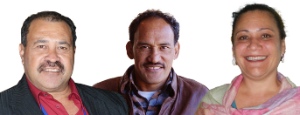
In common with many Pacific island countries, the Cook Islands face the effects of climate change and natural hazards and disasters such as tsunamis, droughts, fires and cyclones, all of which have the potential to cause set backs to economic, social and cultural development.
Two hundred delegates and experts, from 22 Pacific island countries and territories and around the world, met at the 3rd Session of the Pacific Platform for Disaster Risk Management to examine ways to mitigate the impact of disasters, including the impacts of climate change, on Pacific regional development.
Representing the Cook Islands at the SPC/SOPAC Division-organised Platform in Auckland New Zealand last week (01-05 August) were Mr Mac Mokoroa, Chief of Staff, Office of the Prime Minister, Ms Elizabeth Wright-Koteka, Director of the Cook Islands Central Planning and Policy Office, Ms Dallas Young, Ministry of Finance and Economic Development, and Mr Charles Carlson, Director of Emergency Management Cook Islands.
“The Cook Islands Government, in recognising the overlap between Disaster Risk Reduction and Climate Change Adaptation, sees the need to harmonise the policies and implementation of each, and has committed to combining these in a joint National Action Plan. This plan can feed directly into the country’s national strategic development planning processes.
“It makes sense to use human, financial and institutional resources more efficiently while raising the profile of both Disaster Risk Reduction and Climate Change Adaptation,” explained Ms Wright-Koteka.
Ms Wright-Koteka said that the goals of the joint action plan include a well-informed community, as this is vital to the overall effective preparedness, response and recovery of the nation to hazardous events. To be better able to cope with the impacts of climate change, such as sea level rise, cyclones and storm surges, the community needs to be involved and aware.
It is within the community context that Chief of Staff Mr Mokoroa drew attention to the work that is taking place on all of the islands in the Cooks, with Disaster Response Plans being put in place, Safety Centres being set up, and sirens for early warning systems being installed.
Mr Mokoroa said that even as the Platform was taking place, an automatic weather station had been installed in Auitaki, and updating of the Rarotonga automatic weather station was about to begin.
“This improves our ability to receive better forecasting. It allows our meteorologists to provide better quality information to our country in the event of a cyclone heading our way,” said Mr Mokoroa.
Mr Carlson of EMCI pointed out that after criticism of Government agencies’ delayed response to five cyclones in 2005 and Cyclone Pat in 2010, a contributing factor was found to be the lack of flexibility Ministries had in re-allocating funds to meet the cost of transporting personnel, supplies and equipment to disaster-struck areas.
The Disaster Assistance Emergency Fund announced in January this year by Prime Minister, Hon. Henry Puna, has had the allocation of $200,00NZD from the Government Reserve Fund approved by Cabinet.
With assistance from SPC/SOPAC Division, the Cook Islands Government is developing the management arrangements of the Fund. It is envisaged that in times of natural disasters and emergencies, this Fund will improve the immediate response time whilst awaiting responses from donor agencies.
The work carried out in the Cook Islands establishing the Fund and in harmonising policies can be used as a model by other countries. It informs planning at the national level, and preparedness at the grassroots level.
The Cook Islands representatives agreed that their country was giving a strong lead to other Pacific Island nations as to how a pro-active, committed government and an educated population can play their part in preparedness, disaster risk reduction and climate change adaptation
“Part of the success of the 3rd Session of the Pacific Platform for Disaster Risk Management was the inclusion of people from finance, policy and planning departments and agencies. They now better understand the needs of the region’s offices for Disaster Risk Management,” concluded Ms Wright-Koteka.
Photo caption: Cook Island delegates Charles Carlson, Mac Mokoroa and Elizabeth Wright-Koteka at the 3rd Session of the Pacific Platform for Disaster Risk Management.





